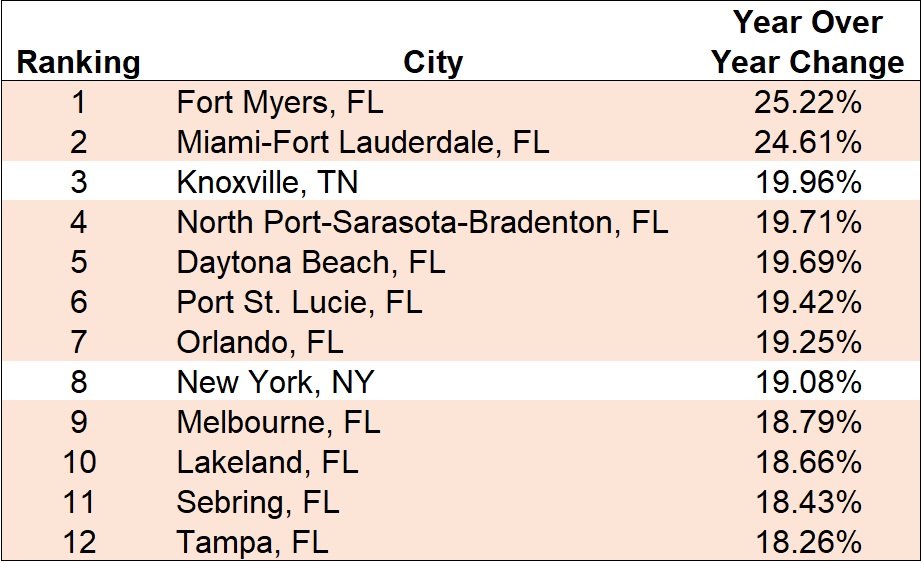
Rent Control Redux: Florida Edition

Rents are rising in cities across the United States, but nowhere are rents increasing more rapidly than in Florida, according to several leading indicators. A look at the numbers tells the story. The Waller, Weeks, and Johnson Rental Index each found that ten of the top twelve American cities where rents are rising the most are, as of this writing, located in the Sunshine State.

The index – a report co-produced by housing experts at Florida Atlantic University, Florida Gulf Coast University, and the University of Alabama – tracks historical data on rents in 109 cities across the country, including eleven cities in Florida. The data show that, from July last year to July this year, ten of the eleven Florida cities listed in the index saw average rents rise by more than 18%. Rent hikes in South Florida and in Fort Myers were especially pronounced, with both areas posting 25% year-over-year increases in average rents.
This summer, in both Tampa and nearby Saint Petersburg, city councilmembers considered holding referendums on rent control. But in the end, councilmembers in both cities rejected the idea.
Tampa City Councilman Guido Maniscalco originally supported a referendum but decided against it when it came time to cast his final vote. He argued that sending rent control to the ballot would give renters “the false assumption that we’re helping when, ultimately, nothing or very little is going to get done.”
Emily Hamilton, a housing economist and Senior Research Fellow at the Mercatus Center, agrees that however well-intentioned, rent control is not only ineffectual but also counterproductive. “The fundamental cause of housing affordability problems is that there’s not enough housing,” she said, in a recent interview with Housing Solutions Coalition. “Rent control cannot address that problem. It can only make that problem worse.”
Ken Johnson – one of the experts behind the Waller, Weeks, and Johnson Rental Index – echoed her comments, calling rent control “a monumentally bad idea.” He reiterated that Florida is suffering from a “severe supply and inventory shortage,” and argued that enacting rent control would send the wrong message to developers and homebuilders who are needed to help the state build its way out of the crisis. “It seems to be a near-term solution,” he said, “but it will not be good for housing prices. It won’t be good for the production of units.”
In Orange County, however, elected officials appear not to have gotten the memo. Despite mounting empirical evidence that rent control discourages housing production, encourages gentrification and makes it harder to find an apartment, County Commissioners approved a resolution sending rent control to the ballot. If approved by voters in November, the resolution would cap rent increases in Orange County at 9.8% for one year.
Orange County Commissioner Emily Bonilla, who sponsored the measure, called it an “immediate solution to the problem” of rising rents. But even the County Commission’s own experts seem to disagree with her assessment.
In April, when activists first began pushing for a rent control referendum, the Commission took steps to explore the idea by retaining an independent team of researchers at GAI Consultants, Inc. The team was hired to study the effects that rent control might have on the county’s housing market. The result was a 54-page report warning of the dangers posed by rent control.
“The issues driving [housing] costs are deeply structural and a product of regional and national market influences, likely beyond the control of local regulation. Most stem from inadequate housing production over the years which a temporary rent ceiling would do little to correct,” the team wrote. The report then goes on to say that “rent stabilization may impede the objective of speeding overall housing deliveries as well as create a number of unintended consequences.”
Furthermore, GAI’s researchers warned that a rent control referendum may not survive legal scrutiny.
Under Florida law, local governments are banned from enacting rent control. There is, however, one exception to this ban. If a local government finds that there is a “housing emergency so grave as to constitute a serious menace to the general public,” and finds also that rent control is “necessary and proper” to eliminate it, then – and only then – may that local government hold a referendum allowing voters to enact regulations on rent.
But if the legality of the referendum is challenged in court, the law requires that the local government bear the burden of proof. The local government must show, with facts, not only that there is a “grave” housing emergency but also that rent control is a “necessary” means of addressing it.
Such facts would be difficult to prove in court, according to Scott Glass, an attorney with the law firm Shutts & Bowen. Glass recently gave a presentation to the County Commission on behalf of his client, Florida Realtors. “The Legislature has stacked the deck against you,” the last slide of his presentation read, “Please don’t waste taxpayer money placing a sucker’s bet.”
That warning may prove prophetic. Deciding not to wait for election results in November, the Florida Realtors filed a lawsuit against Orange County in the Ninth Judicial Circuit Court. The lawsuit asks Judge Jeff Ashton to enjoin the referendum and block it from the ballot entirely.
In our next blog post, we will spotlight Gainesville, FL, which took a different approach to its housing affordability challenges.





